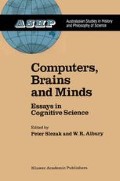Abstract
How much of the mind is a computer? Computational psychologists, who ‘see psychology as the study of the various computational processes whereby mental representations are constructed, organised and transformed’, 1say that most if not all of it is. I think they are wrong. Most of the mind is not a computer: most mental processes are not computations.
This paper is a sequel to my reply12 to Margaret Boden,13 stimulated by criticisms made at a symposium, and later by Philip Johnson-Laird and Jerry Fodor. It was developed through seminars at the Institute for Systems Studies in Moscow and at La Trobe University before being given to the Sydney Symposium on Cognitive Science in August 1985. Since then it has been further revised in the light of seminars at the Queen’s University Belfast, Trinity College Dublin, the Institute of Philosophy in Newcastle-upon-Tyne, Cambridge University and St David’s University College Lampeter. I am much indebted to those who took part in all those seminars, to others at Adelaide University and the Australian National University with whom I discussed it, and to Eliott Sober, Huw Price, Peter Gibbins, Benedict Heal and Jeremy Butterfield, whose comments on this and related topics have influenced it (if not always in ways they would approve of).
Access this chapter
Tax calculation will be finalised at checkout
Purchases are for personal use only
Preview
Unable to display preview. Download preview PDF.
Notes
M.A. Boden (1984) ‘What is Computational Psychology?’, Aristotelian Society Supplementary Volume LVIII, pp. 17–35.
S.P. Stich (1983) From Folk Psychology to Cognitive Science, MIT.
J.A. Fodor (1981) Representations,Harvester.
F.I. Dretske (1981) Knowledge and the Flow of Information, Blackwell.
P.N. Johnson-Laird (1983) Mental Modes, Cambridge University Press.
D.H. Mellor (1987) ‘What is Computational Psychology? II?, Aritotelian Society Supplementary Volume LVIII, pp. 37–53 (at p. 43).
D. Marr (1982) Vision, Freeman.
G.E. Moore (1942) A Reply to My Critics - The Philosophy of G.E. Moore, P.A. Schilpp (ed.), Northwestern University Press, pp. 553–677.
N. Block (ed.), (1980) Readings in the Philosophy of Psychology I, Methuen.
R.C. Jeffrey (1983) The Logic of Decision (second edition), University of Chicago Press.
Author information
Authors and Affiliations
Editor information
Editors and Affiliations
Rights and permissions
Copyright information
© 1989 Kluwer Academic Publishers
About this chapter
Cite this chapter
Mellor, D.H. (1989). How Much of the Mind is a Computer?. In: Slezak, P., Albury, W.R. (eds) Computers, Brains and Minds. Australasian Studies in History and Philosophy of Science, vol 7. Springer, Dordrecht. https://doi.org/10.1007/978-94-009-1181-9_3
Download citation
DOI: https://doi.org/10.1007/978-94-009-1181-9_3
Publisher Name: Springer, Dordrecht
Print ISBN: 978-94-010-7026-3
Online ISBN: 978-94-009-1181-9
eBook Packages: Springer Book Archive

